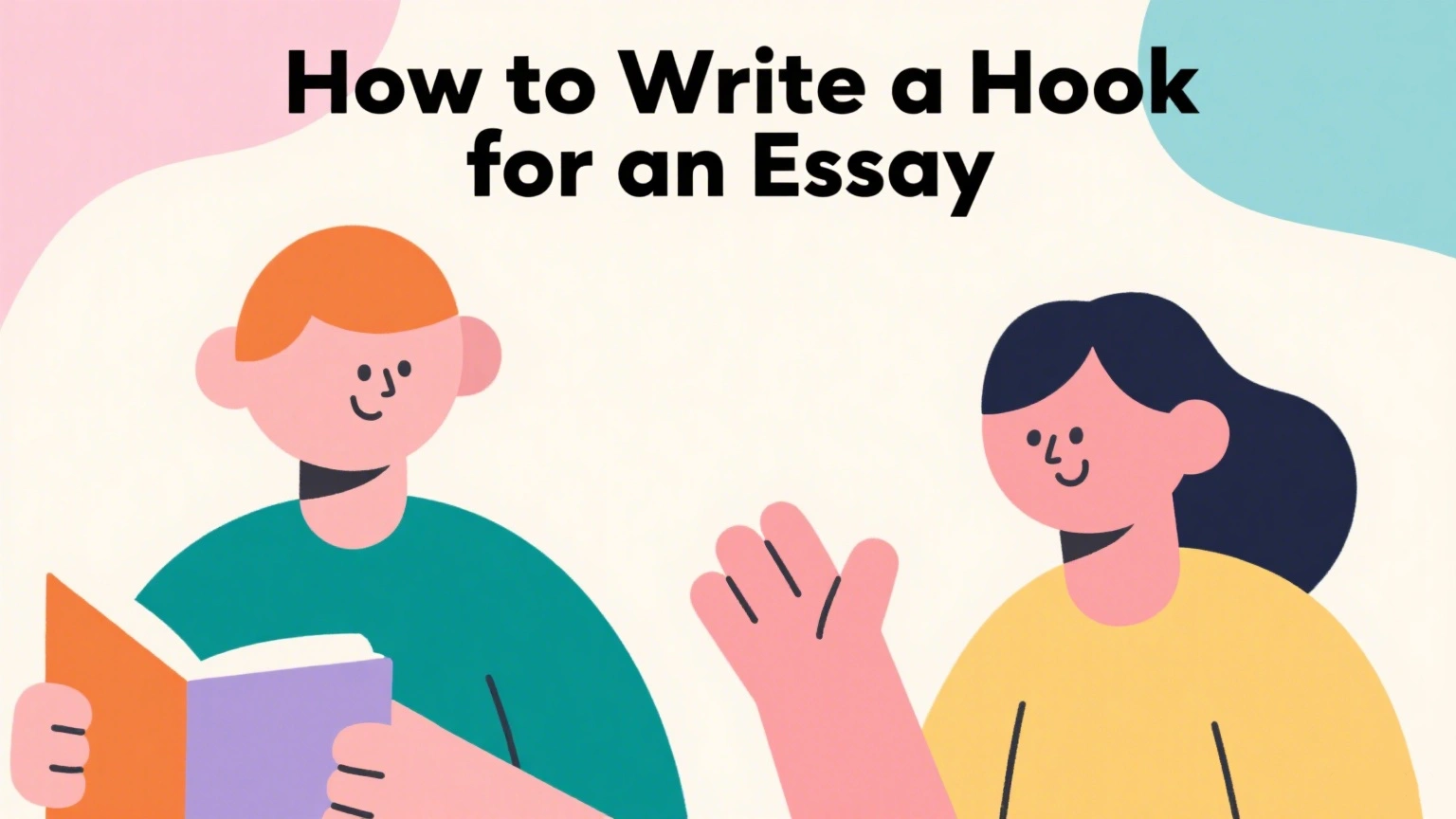如何为文章写一个引人入胜的开头:5种有效策略

你文章的开篇句子是你吸引读者注意力并说服他们阅读你整篇文章的最好机会。许多学生努力想出一个好的文章开头,却发展出平淡无奇的句子开头。
无论你是写个人叙述、议论文还是研究论文,了解如何为文章写一个引人入胜的开头可以让你的写作从众多文章中脱颖而出。这份全面的指南将教会你确切的如何为文章写一个引人入胜的开头 ,以便你的开篇句子立即吸引你的读者。
是什么构成了有效的文章开头?
文章的开头是文章的开篇陈述。它的设计是为了抓住你的观众的注意力,让他们想要继续阅读。从本质上讲,它为你的整篇文章设定了基调,并为接下来的内容创造了期待。最有效的开头有几个关键特点:
与主题相关:你的开头必须直接与你文章的主要论点或主题相连。一个与内容无关的精彩的开头只会混淆读者。
适当的语气:你的开头的风格应该与你文章的整体语气相匹配。一个幽默的轶事可能适用于个人文章,但对于严肃的学术论文来说则不合适。
立即产生影响:好的开头立刻起作用。它们不需要大量的设置或解释就能有效。
5种经过验证的策略:如何为文章写一个引人入胜的开头
1. 引人深思的问题
修辞问题是很受欢迎的文章开头,因为它们让读者思考。这种技巧通过立即让你的听众参与到你的主题中来工作,迫使他们在阅读你的论点之前考虑自己的观点。
示例:素食主义文章中的"吃动物是道德的吗?"。
为什么它有效:问题通过触发读者的自然好奇心和寻找答案的愿望,创造了即时的参与感。
2. 令人惊讶的统计数据和事实
当文章讨论科学主题、社会问题、时事或有争议的主题时,与文章主题相关的一个事实或统计数据可以成为一个引人注目的开头。
不要说"科技改变了我们的生活",你可以写,"平均每个人每天检查手机96次——每10分钟一次。"
这种方法立即建立了可信度,同时用出乎预料的信息震惊读者,挑战他们的假设。
3. 生动的轶事和场景设置
个人故事或描述性场景可以从开篇行就吸引读者进入你的世界。"我的手在颤抖,汗水从我的脸上滚落。我再次检查了方向,然后组装我的工具并加热。"
关键是选择直接与你的主要论点相关的轶事,并避免分散注意力的不必要的细节。
4. 大胆的声明和挑衅性主张
强烈、自信的断言可以立即建立你的立场并挑战传统思维。这些开头特别适合需要建立清晰立场的议论文。
示例:"大学教育已成为现代历史上最昂贵的骗局。"
5. 相关的引用
虽然引用可以是有效的,但它们需要仔细选择以避免陈词滥调。选择那些真正照亮你的主题的引用,而不是每个人都听过的通用励志名言。
常见的开头错误,扼杀读者兴趣
了解什么不起作用与知道有效的策略同样重要。许多高中生陷入可预测的模式,文章以"你有没有曾经...?嗯,我有..."的变化开始
过度使用的模式:避免像"自从时间的黎明,"、"在今天的社会,"或"韦氏词典定义..."这样的陈词滥调开头。
不相关的戏剧性:不要制造与你实际主题无关的兴奋。如果你的文章是关于环境政策的,不要以一场汽车追逐开场。
模糊的泛泛而谈:像"关于这个话题有很多不同的观点"这样的陈述告诉读者什么都没有,浪费了他们的时间。
问题过多:虽然问题可以是有效的,但避免连续问多个问题或使用过于明显的问题。
将你的开头与你的文章类型相匹配
不同类型的文章在学会如何为文章写一个引人入胜的开头时,受益于不同的开头方法:
议论文的开头通常以令人惊讶的统计数据、挑衅性的声明或让读者想知道你如何支持这个立场的问题开始。
个人叙述通常以轶事开头,让读者进入一个场景或一组想法。
研究论文通常以基于事实的开头或专家声明开始,为你即将呈现的研究提供背景。
分析性文章通常以与你在文章中采取的分析方法相关的引人深思的问题开始。
测试和完善你的开头
一旦你写了你的开头,通过问自己来评估其有效性:
● 它是否直接与我的主要论点相关?
● 这个开头会不会让我想要继续阅读?
● 它是否为我的论文建立了适当的语气?
● 它是否足够具体以引起兴趣,但又足够宽泛以引导进入我的论点?
记住,你的开头应该自然地流入你的论点陈述。最好的开头在吸引注意力和呈现你的主要论点之间创造了一个逻辑桥梁。
使用现代工具提升你的写作
当你在提高你的开头写作技巧时,你可能想要考虑如何使用技术来提高你的写作。GPTHumanizer可以帮助你确保你精心制作的开头保持自然和吸引人的语气。无论你是在完善还是润色内容,保持真实的声音和风格都很重要。
常见问题
文章开头的最佳类型是什么?最有效的开头取决于你的特定文章类型和受众。个人叙述通常受益于轶事,而议论文则适合使用令人惊讶的统计数据或挑衅性问题。
文章开头应该有多长?最有效的开头通常是1-2句话长。更长的开头有失去影响力和显得不集中的风险。
我可以用引用作为我的文章开头吗?可以,但选择真正相关且不常用的引用。避免使用陈词滥调的励志引用,这些引用并不具体照亮你的主题。
写文章开头时我应该避免什么?避免使用"你有没有曾经..."问题、词典定义、过于宽泛的声明和与你实际主题无关的戏剧性。
我怎么知道我的开头是否有效?通过大声朗读你的开头并问自己它是否让你想要继续阅读来测试你的开头。它应该立即引起兴趣,同时清楚地与你文章的主要主题相关。
当你学习如何为文章写一个引人入胜的开头时,定制实践和对你特定受众和目标的敏锐意识是必要的。知道如何为文章写一个引人入胜的开头涉及开篇行,这些行不仅要吸引注意力,而且要真正与你文章的内容相关,以便你的文章立即读起来更吸引人、更难忘。
